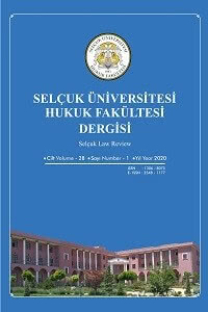Nefret Suçu ve John Stuart Mill'in "Zarar Prensibi"
HATE CRIME AND JOHN STUART MILL’S “HARM PRINCIPLE”
___
- COMTE, Auguste. Auguste Comte and Positivism: The Essential Writings. Transaction Publishers, New York, 1975.
- ÇAKAR, Bekir. "Avrupa ve ABD’de Artan Salgın: Nefret Suçu". The GLOBAL: A Journal of Policy and Strategy, C. 1, S. 2, 2016. http://www.academia.edu/download/46435846/makale-5.pdf. (E.T. 05.03.2019).
- COMTE, Auguste. Auguste Comte and Positivism: The Essential Writings, New York 1975.
- DYZENHAUS, David, "John Stuart Mill and the Harm of Pornography", Ethics, C. 102, S. 3, 1992, ss. 534–551.
- GEORGE, William H., "Auguste Comte: Sociology and the New Politics", AmericanJournal of Sociology, C. 33, S. 3, 1927, ss. 371–381.
- HAMBURGER, Joseph, John Stuart Mill on Liberty and Control, New Jersey, 2001.
- HARCOURT, Bernard E., "The Collapse of the Harm Principle" The Journal of Criminal Law and Criminology (1973-) C. 90, S. 1, 1999, ss. 109–194.
- HARRIS, Abram L., "John Stuart Mill’s Theory of Progress", Ethics, C. 66, S. 3, 1956, ss. 157–75.
- KEMP, Tom, Industrialization in Nineteenth Century Europe, New York , 2014.
- KURER, Oskar, John Stuart Mill (Routledge Revivals): The Politics of Progress, New York, 2016.
- MILL, John Stuart, Hürriyet Üstüne, (Çev.) DOSTEL, M. Osman, Ankara, 2012.
- MILL, John Stuart, The Positive Philosophy of Auguste Comte, New York, 1873.
- MILL, John Stuart ve WARNOCK Mary. Utilitarianism and On Liberty; Including Mill’s Essay on Bentham and Selections from theWritings of Jeremy Bentham and John Austin, 2. Baskı, Berlin, 2003.
- SINAR, Hasan. ‘Türk Hukuku’nda Nefret Suçlarına Ilişkin Yasal Düzenleme Çalışmaları’, Marmara Üniversitesi Hukuk Fakültesi Hukuk Araştırmaları Dergisi, C. 2, 2003.
- TOPAKKAYA, Arslan. ‘Hobbes, Locke, Rousseau ve Kant Hukuk Felsefelerinde Bireysel Özgürlükle Toplumun Genel İradesi Arasındaki İlişkinin Kurulumu Üzerine Bir Analiz’. Düşünen Siyaset, S. 24, 2007, ss. 55–66.
- TURNER, Piers Norris, "Harm and Mill’s Harm Principle", Ethics, C. 124, S. 2 (2014): 299–326.
- ISSN: 1306-8075
- Yayın Aralığı: 4
- Başlangıç: 1988
- Yayıncı: Selçuk Üniversitesi
Osmanlı Hukukunda Hukuki Ehliyet Arızası Olarak Maraz-ı Mevt (Ölüm Hastalığı)
Nefret Suçu ve John Stuart Mill'in "Zarar Prensibi"
İdare Hukuku Açısından Avukatlık
Mülkiyet ve Zilyetlik Üzerine Düşünceler
Ticaret Şirketlerinde Ortakların Kişisel Alacaklılarının Şirkete Yöneltebilecekleri Haciz Talepleri
Nefret Suçu ve John Stuart Mill'in "Zarar Prensibi"
4734 Sayılı Kamu İhale Kanununda Doğrudan Temin Usulü
Ümit Süleyman ÜSTÜN, Hande Sena ÇALIŞ
Emlak Vergisi Özelinde Vergi Güvenlik Önlemlerinin Değerlendirilmesi
